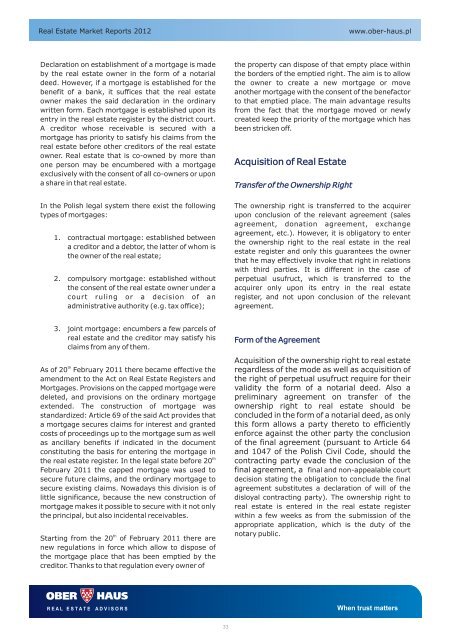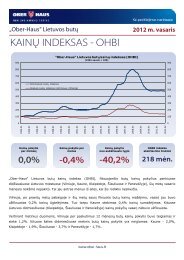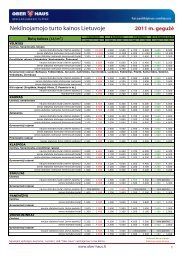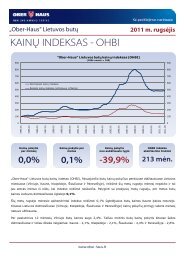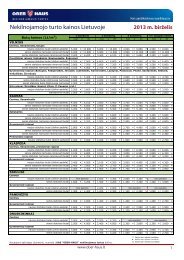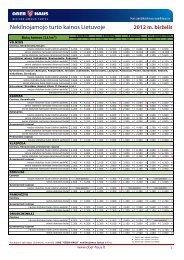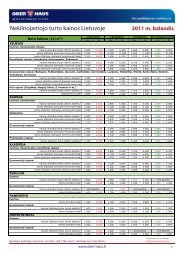Real Estate Market Report 20 Poland 12 - Ober-Haus
Real Estate Market Report 20 Poland 12 - Ober-Haus
Real Estate Market Report 20 Poland 12 - Ober-Haus
You also want an ePaper? Increase the reach of your titles
YUMPU automatically turns print PDFs into web optimized ePapers that Google loves.
<strong>Real</strong> <strong>Estate</strong> <strong>Market</strong> <strong>Report</strong>s <strong>20</strong><strong>12</strong><br />
Declaration on establishment of a mortgage is made<br />
by the real estate owner in the form of a notarial<br />
deed. However, if a mortgage is established for the<br />
benefit of a bank, it suffices that the real estate<br />
owner makes the said declaration in the ordinary<br />
written form. Each mortgage is established upon its<br />
entry in the real estate register by the district court.<br />
A creditor whose receivable is secured with a<br />
mortgage has priority to satisfy his claims from the<br />
real estate before other creditors of the real estate<br />
owner. <strong>Real</strong> estate that is co-owned by more than<br />
one person may be encumbered with a mortgage<br />
exclusively with the consent of all co-owners or upon<br />
a share in that real estate.<br />
In the Polish legal system there exist the following<br />
types of mortgages:<br />
1. contractual mortgage: established between<br />
a creditor and a debtor, the latter of whom is<br />
the owner of the real estate;<br />
2. compulsory mortgage: established without<br />
the consent of the real estate owner under a<br />
court ruling or a decision of an<br />
administrative authority (e.g. tax office);<br />
3. joint mortgage: encumbers a few parcels of<br />
real estate and the creditor may satisfy his<br />
claims from any of them.<br />
th<br />
As of <strong>20</strong> February <strong>20</strong>11 there became effective the<br />
amendment to the Act on <strong>Real</strong> <strong>Estate</strong> Registers and<br />
Mortgages. Provisions on the capped mortgage were<br />
deleted, and provisions on the ordinary mortgage<br />
extended. The construction of mortgage was<br />
standardized: Article 69 of the said Act provides that<br />
a mortgage secures claims for interest and granted<br />
costs of proceedings up to the mortgage sum as well<br />
as ancillary benefits if indicated in the document<br />
constituting the basis for entering the mortgage in<br />
th<br />
the real estate register. In the legal state before <strong>20</strong><br />
February <strong>20</strong>11 the capped mortgage was used to<br />
secure future claims, and the ordinary mortgage to<br />
secure existing claims. Nowadays this division is of<br />
little significance, because the new construction of<br />
mortgage makes it possible to secure with it not only<br />
the principal, but also incidental receivables.<br />
th<br />
Starting from the <strong>20</strong> of February <strong>20</strong>11 there are<br />
new regulations in force which allow to dispose of<br />
the mortgage place that has been emptied by the<br />
creditor. Thanks to that regulation every owner of<br />
33<br />
the property can dispose of that empty place within<br />
the borders of the emptied right. The aim is to allow<br />
the owner to create a new mortgage or move<br />
another mortgage with the consent of the benefactor<br />
to that emptied place. The main advantage results<br />
from the fact that the mortgage moved or newly<br />
created keep the priority of the mortgage which has<br />
been stricken off.<br />
Acquisition of <strong>Real</strong> <strong>Estate</strong><br />
Transfer of the Ownership Right<br />
The ownership right is transferred to the acquirer<br />
upon conclusion of the relevant agreement (sales<br />
agreement, donation agreement, exchange<br />
agreement, etc.). However, it is obligatory to enter<br />
the ownership right to the real estate in the real<br />
estate register and only this guarantees the owner<br />
that he may effectively invoke that right in relations<br />
with third parties. It is different in the case of<br />
perpetual usufruct, which is transferred to the<br />
acquirer only upon its entry in the real estate<br />
register, and not upon conclusion of the relevant<br />
agreement.<br />
Form of the Agreement<br />
www.ober-haus.pl<br />
Acquisition of the ownership right to real estate<br />
regardless of the mode as well as acquisition of<br />
the right of perpetual usufruct require for their<br />
validity the form of a notarial deed. Also a<br />
preliminary agreement on transfer of the<br />
ownership right to real estate should be<br />
concluded in the form of a notarial deed, as only<br />
this form allows a party thereto to efficiently<br />
enforce against the other party the conclusion<br />
of the final agreement (pursuant to Article 64<br />
and 1047 of the Polish Civil Code, should the<br />
contracting party evade the conclusion of the<br />
final agreement, a final and non-appealable court<br />
decision stating the obligation to conclude the final<br />
agreement substitutes a declaration of will of the<br />
disloyal contracting party). The ownership right to<br />
real estate is entered in the real estate register<br />
within a few weeks as from the submission of the<br />
appropriate application, which is the duty of the<br />
notary public.


